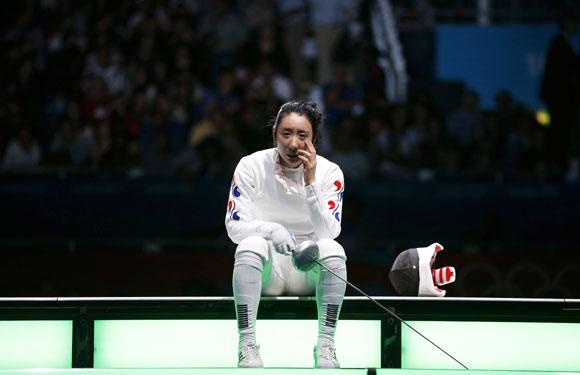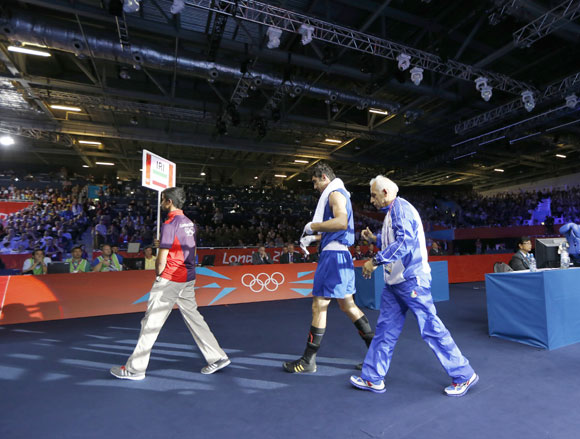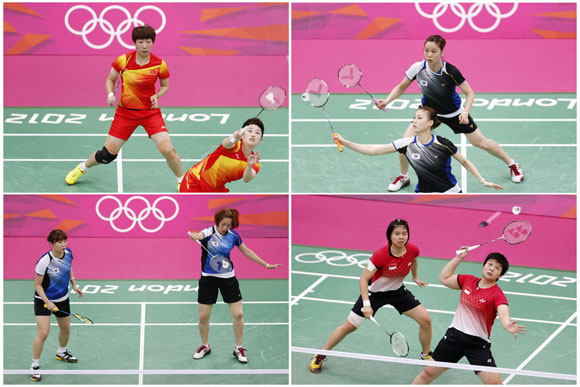 | « Back to article | Print this article |
And the gold for dramatic gesture goes to...
Losing at the Olympics hurts. But suffering an injustice, real or imagined, is agony.
The 2012 Games have been peppered with debatable refereeing, a technical glitch in fencing, post-race relegation and - this one a first - the controversial expulsion of eight badminton players judged to have broken the spirit, but not the rules, of their sport.
Throw in an embarrassing mix-up over national flags and a fair measure of crowd-power, and London has provided its share of memorable moments where passion has spilled into protest and petulance, frustration and fury.
Early frontrunners for drama gold include South Korea's Shin A-lam, who sat on the fencing piste, weeping, for an hour in protest at her elimination from the epee semi-final.
She is up against the North Korean women's soccer team, who refused to take the field in the city of Glasgow for a match against Colombia because a giant video screen mistakenly showed the flag of their country's sworn enemy South Korea.
'It was a set-up,' growled Mazaheri
Iranian boxer Ali Mazaheri stormed out of the ring after being disqualified.
Mazaheri's protest was shorter but more explosive.
On learning that he had been disqualified for persistent holding against Cuban Jose Larduet Gomez, the heavyweight left the ring before the referee held his opponent's hand aloft.
"It was a fix," the Iranian growled. "It was a set-up."
The International Amateur Boxing Association defended the disqualification, although other London boxing results have been vociferously disputed, and a Turkmen referee was thrown out of the Games for bad refereeing.
Disqualified Pendleton held her head in disbelief
Home cyclist Victoria Pendleton simply held her head in disbelief after being disqualified in an event where she could have won gold, then fought back tears in an interview.
"Many athletes have worked with their support teams on possible outcomes," said Andrew Lane, professor of sports psychology at the University of Wolverhampton in England, "but these unusual decisions you just can't cater for."
For all the theatrics, London still has some way to go to match previous Olympics.
In Seoul in 1988, South Korean boxer Jung-Il Byun refused to leave the ring for 67 minutes after losing a fight and was left in darkness after organizers decided to switch off the lights.
'I thought I had won'
London's ExCel Centre erupted in boos of derision when South Korea's Cho Jun-ho was judged to have beaten Japan's Masashi Ebinuma after a close judo encounter.
Startled judges referred their decision to a reviewing jury, which took the unprecedented step of overturning the result.
Perhaps fellow Olympians could learn from the ultimately defeated Cho.
Despite looking perplexed at the bizarre turn of events, he left the mat without dissent and refused to criticize referees.
"I thought I had won," he said. "We both won bronze medals so I'm very happy."
'You have heartlessly shattered our dreams'
The crowd also jeered and booed loudly at Wembley Arena during two women's badminton matches when pairs from China, Indonesia and South Korea deliberately tried to lose to secure an easier draw in the subsequent knockout rounds.
The embarrassing scenes quickly attracted the attention of officials and media, and led to the expulsion of the eight players involved.
One of them, Yu Yang of China, pointed out to the sport's administrators that she was playing within the rules and said she would quit the sport.
"You have heartlessly shattered our dreams," she wrote on her Tencent microblog. "This is my last competition. Goodbye Badminton World Federation, goodbye my beloved badminton."

© Copyright 2025 Reuters Limited. All rights reserved. Republication or redistribution of Reuters content, including by framing or similar means, is expressly prohibited without the prior written consent of Reuters. Reuters shall not be liable for any errors or delays in the content, or for any actions taken in reliance thereon.




